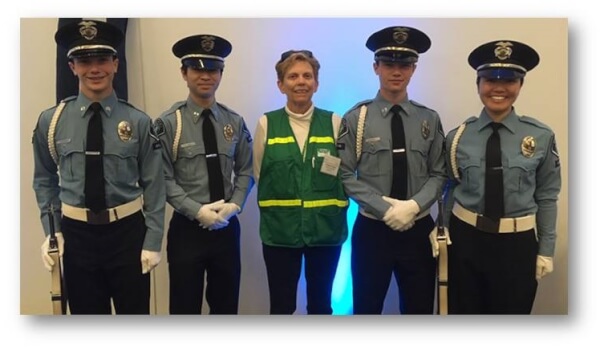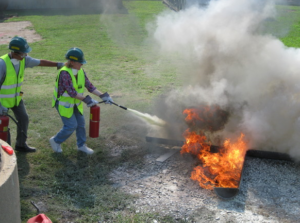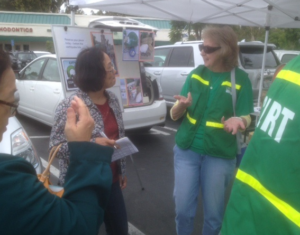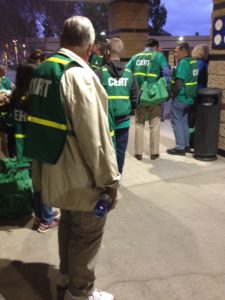If you’ve been following our Advisories for a while, you know that we base a lot of our preparedness activities on CERT principles.

In good company!
We took the CERT training in 2001 — more than 15 years ago! We continue to support the local team. The image shows me at a CERT Appreciation Breakfast last weekend. I’m there with the Police Explorer honor guard. (Had to get up close to those outstanding young people!)
What is CERT?
CERT, of course, stands for Community Emergency Response Team. It’s a training program that fits under the umbrella of Citizen Corps. The Corps is a Federal Program started after 9/11 to help citizens get involved in protecting their neighborhoods.
(I looked it up: Citizen Corps manages six programs — CERT, Fire Corps, National Neighborhood Watch, Medical Reserve Corps, Volunteers in Police Service and the Corporation for National and Community Service. All these fall under the umbrella of the Federal Emergency Management Agency, FEMA.)
According to the CERT website, its purpose is to “educate people about disaster preparedness and train them in basic disaster response skills, such as fire safety, light search and rescue, and disaster medical operations.” To see the whole detailed description, plus a few photos, head to the official site: https://www.ready.gov/community-emergency-response-team
The great thing about CERT
The training is standardized across the country.It is usually offered FREE OF CHARGE by coordinators from your city’s administration, local fire department and/or local police department.

Training session – note “Buddies”
If you want to understand what would happen to your community in an emergency, I urge you to get this training!
- It’s fun, sometimes challenging, always well done. (Trainers are certified.)
- You’ll make new friends of people you never would come into contact with otherwise.
- You’ll review some first aid basics you learned way back when. Plus you will get a lot of new info like how to use radio technology and be ready for an active shooter. Follow-up programs let you practice using equipment like flares and fire extinguishers.
- Your understanding of the role of First Responders will change.
- And you’ll come out with some basic emergency preparedness gear: backpack or duffel bag, gloves, flashlight, face mask, etc.

Earthquake outreach to the community
And after the training, CERT members can be activated to serve.
We’ve promoted our city’s program, and participated every year in one or the other of the ongoing trainings they put on. Along the way we’ve been called up by the police department to help at events like these:
- Volunteers were requested at 11:30 pm to help with searches for lost citizens. (Both times, the lost person was older and suffered from some sort of dementia. Both times, the lost person was found, but only after he had spent the night outdoors, who knows where . . .)
- We provided support to various city-sponsored community events, like fairs and races – staffing booths, directing traffic, etc.
- CERT members did a door-to-door distribution of flyers to promote an anti-crime initiative. We also helped residents prepare for a possible weather event.
Every time we show up, we see some of our classmates!

Joe waiting for his assignment at a recent drill (before it started raining)
In this past year of significant disasters, other CERT members around the country have performed a variety of services. Some staffed HAM radio stations, others worked in emergency shelters. CERT members acted as wildfire spotters. Others supported community programs like installing smoke alarms, and helping manage pets during evacuations.
Where CERT is weak
All CERT trained individuals come out a lot more confident and a lot more knowledgeable. They are ready to provide support to First Responders in emergencies.
Problem #1: After the training people go right back into a neighborhood where most of the others are still unaware and unprepared!
That training could be spread to more people in the neighborhood – but in most cases it is simply squandered.
Now that our city has nearly 2,000 graduates, they are trying to build a stronger community network of CERT grads. But they have run into a major problem that has plagued the effort for years.
Problem #2: The city, due to “privacy concerns,” is unable to share names and addresses of the people who have received the training!
This puts the burden of organizing a local neighborhood group on a single person or family.
What our neighborhood has done with CERT
We have been able to overcome this in our own local neighborhood, as you know. For years we promoted the class, month after month. Eventually we built up a core group of around 30 CERT graduates who were then able to attract even more neighbors – with or without formal CERT training — to join in our local neighborhood emergency response group.
How we built that neighborhood team is, of course, the story I’ve told in my Disaster Survival Series, just published. Our group’s success was based on CERT, our Homeowner Association’s support, and a lot of determined and committed people. I’ve documented all the steps we’ve taken in building the group.
Looking to promote more resilience in your OWN neighborhood?
There are probably a half-dozen or even more good training programs that would benefit your neighbors and could be molded into a neighborhood or group training program.
CERT has worked for us because it is free, nationally certified and recognized by property owners and the media. It is non-profit and is supported by our local First Responder community.
I recommend you find out more about CERT availability from your city’s Office of Emergency Management (maybe called the Department of Emergency Management, or Emergency Management Office). It’s possible only a couple of classes will be held each year, but in some communities there will be more. Find out! (If you can’t get training in your town, you can get some of the basics online. )
This is one tax-payer supported program that really pays off.
Virginia
Your Emergency Plan Guide team
We have taken the CERT ball and run with it because, unlike some of the alarmist survivalist factions, we don’t want to be totally on our own in a disaster! We want friendly and prepared neighbors all around!
Don't miss a single Advisory.
Thank you for subscribing.
Something went wrong.
